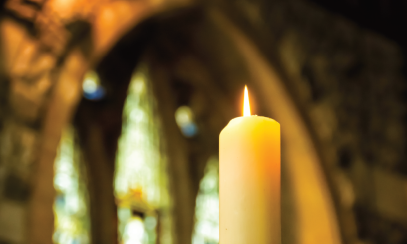
Should we baptize our grandchildren in the kitchen sink?
Dear Fr. Joe: My wife wants to baptize our grandkids in the kitchen sink. I think we should not interfere with our children’s parenting. What do we do?
Greetings in Christ! I’m glad you asked this question – in every parish I’ve been assigned to, I’ve run into this. It seems to be something many people are really struggling with.
I’d like to walk us through some of the teachings of the Church on baptism in order to help you.
The first step I invite you to take is to break out your Catechism of the Catholic Church and take a look at paragraphs 1213-1284. That sounds like a lot of reading, but it’s not – and what is in there should be really helpful to you. What you’ll see is an affirmation of your desire for your grandchild, because baptism is a beautiful gift. Let’s look at what is accomplished in the baptism of a child:
- The child dies to sin and is reborn as an adopted child of God.
- The child will receive grace to receive God’s teachings and love into his or her heart.
- The child “puts on Christ” in baptism. (Gal. 3:27)
- The child is protected and liberated in a special way from any evil power.
- The child is set free from original sin.
When the baptism is celebrated in church, you’ll see numerous signs and symbols that back up each of these points. Not only that, you’ll hear the child’s parents make significant promises to God in the presence of the community that they will work hard to teach their child the faith. They commit to showing their child how to live out baptismal promises in words and deeds.
And that, my friend, is where the trouble with a kitchen baptism can come in.
As Catholics, we understand a distinction between magic and sacraments. Magic in this case being the idea that, “If I do this, then the Lord has to do that,” or “If I don’t do this, the Lord can’t do that.” Magic is an attempted manipulation of the divine.
What we have as followers of Jesus is faith, which is different than magic. We don’t believe God is bound by our sins or the sins of others. We don’t believe that, if we “do” baptism that we force God’s hand. When we celebrate a sacrament, we recognize that it binds us to keep our end of the deal in the covenant.
If we do a kitchen baptism, we recognize that God is going to honor the promises of that covenant and we also recognize that we are promising to teach the child to keep his part of the covenant. In order for that to happen, there simply has to be follow-through. We have to teach the child daily, through word and example, what it means to be a child of God. We need to teach him or her about our beautiful faith and how to live it in a fallen world. We do this to ensure that, as the child grows in age and wisdom, he or she is able to respond to the baptism and keep the promises that are made.
The short way to think of it is this: Jesus tells us that we are either with him or against him; there is no middle place. When we baptize our children, we are promising to raise them to “be on Jesus’ side” for the rest of their lives. If we make that promise, but fail to show them how to live that promise, we are setting our children up for significant spiritual failure.
So, what do we do then? I’d suggest that, after the first step of reading the section on baptism in the catechism, you talk to your kids. If you want, share this article with them (Hi, guys! Hope this helps). Share your hunger to have your grandchild baptized. Share your love of our faith. Share how your faith in Jesus and life in the Church has made your life better; how it has challenged and blessed you. If they still say “no,” ask if you can take spiritual leadership. Ask if you can take their child to your parish for baptism and then assume spiritual responsibility – taking him or her to church every week, to catechism classes, etc. until he or she is old enough to drive to church alone. If, after this, your son and his wife still say “no,” then you must take this to prayer and listen honestly to what God wants from you.
To be honest, I can’t imagine a scenario where the Lord is going to tell you to disregard the parents’ wishes and do what you think is right for someone else. Among other things, consider this: if you unilaterally usurp the parents’ rightful authority over their child, you may cause a family rift with far-reaching consequences. You may find yourself without any relationship at all with your grandchild. Now, I always try to leave room in my heart for God, for wonder, for humility and for openness to God doing something unusual, but that’s the only reason I don’t flat-out type that I don’t think you should do this.
Do make sure you pray daily for your grandchild. Pray that Jesus protects this precious child and leads him or her to God. Pray that God softens the hearts of the parents and open them up to the wonder of faith. As this precious baby gets older, share your love for God and the Catholic Church.
Know this: the Lord loves your grandchild more than you or his or her parents ever could and, he will lead this child to himself. I will pray for you. Enjoy another day in God’s presence.



